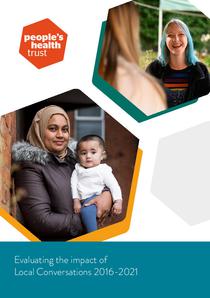The final evaluation report for the Local Conversations Programme shows that developing community power can make a difference to neighbourhoods by building collective agency and action around social determinants of health.
This process results in improvements in many aspects of wellbeing for residents in marginalised communities including trust, connectedness and neighbourhood belonging. Importantly, it has also supported these communities to develop a sense of agency and the belief that things can change from their involvement. However, despite strong evidence of positive change, wider influences including austerity continue to drive worse overall health for people living in areas experiencing the highest levels of disadvantage.
Through six waves of data collection with more than 2800 responses over four years, there is evidence that participation in the programme has led to several positive wellbeing outcomes that are above national averages for similarly disadvantaged areas and even England averages in some cases.
Despite these demonstrable wellbeing benefits for participants and the wider community, Local Conversations participants have consistently reported slightly lower levels of good or very good health than Wales averages, and similarly disadvantaged neighbourhoods in England. Local Conversations residents were also almost twice as likely to report bad or very bad health (10%) than the England average (6%).

Key findings - based on comparison with the Community Life survey
- 82% agree that when people in the area get involved in their local community, they can really change the way the area is run, compared to 50% in similarly disadvantaged neighbourhoods and 54% England average
- 81% said they very or fairly strong believe they belong in their local neighbourhood, compared to 56.2% in similarly disadvantaged neighbourhoods and 61.6% England average.
New Economics Foundation independently evaluated the Local Conversations programme’s theory of change and its impact from 2016 to 2021. This final Local Conversations evaluation was published in February 2022.

